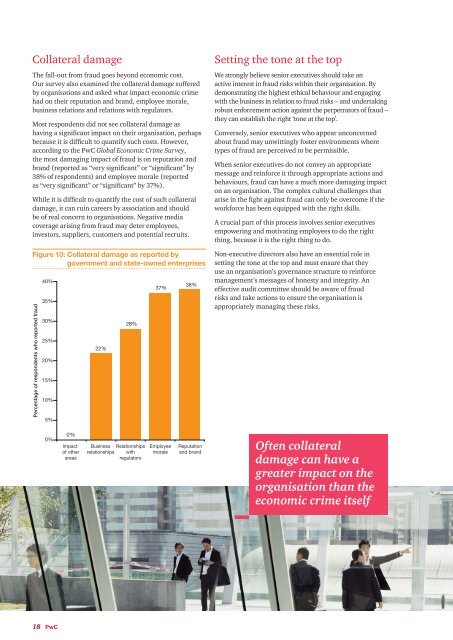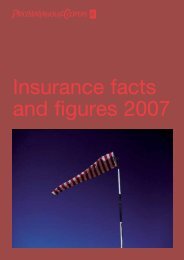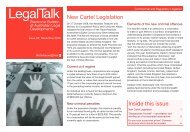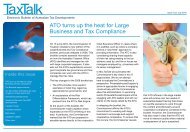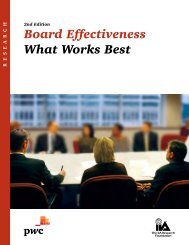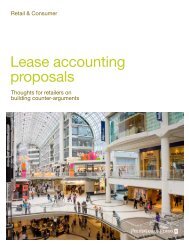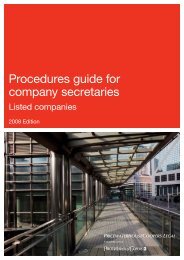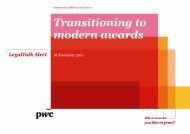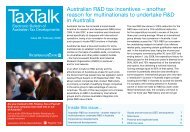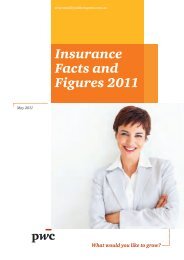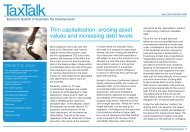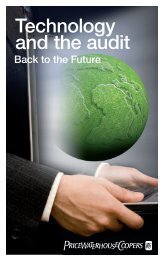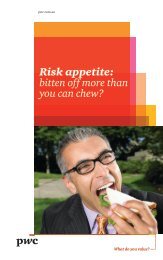Controlling fraud in the public sector - PricewaterhouseCoopers
Controlling fraud in the public sector - PricewaterhouseCoopers
Controlling fraud in the public sector - PricewaterhouseCoopers
You also want an ePaper? Increase the reach of your titles
YUMPU automatically turns print PDFs into web optimized ePapers that Google loves.
Collateral damage<br />
The fall-out from <strong>fraud</strong> goes beyond economic cost.<br />
Our survey also exam<strong>in</strong>ed <strong>the</strong> collateral damage suffered<br />
by organisations and asked what impact economic crime<br />
had on <strong>the</strong>ir reputation and brand, employee morale,<br />
bus<strong>in</strong>ess relations and relations with regulators.<br />
Most respondents did not see collateral damage as<br />
hav<strong>in</strong>g a significant impact on <strong>the</strong>ir organisation, perhaps<br />
because it is difficult to quantify such costs. However,<br />
accord<strong>in</strong>g to <strong>the</strong> PwC Global Economic Crime Survey,<br />
<strong>the</strong> most damag<strong>in</strong>g impact of <strong>fraud</strong> is on reputation and<br />
brand (reported as “very significant” or “significant” by<br />
38% of respondents) and employee morale (reported<br />
as “very significant” or “significant” by 37%).<br />
While it is difficult to quantify <strong>the</strong> cost of such collateral<br />
damage, it can ru<strong>in</strong> careers by association and should<br />
be of real concern to organisations. Negative media<br />
coverage aris<strong>in</strong>g from <strong>fraud</strong> may deter employees,<br />
<strong>in</strong>vestors, suppliers, customers and potential recruits.<br />
Figure 10: Collateral damage as reported by<br />
government and state-owned enterprises<br />
Percentage of respondents who reported <strong>fraud</strong><br />
40%<br />
35%<br />
30%<br />
25%<br />
20%<br />
15%<br />
10%<br />
5%<br />
22%<br />
28%<br />
37%<br />
38%<br />
Sett<strong>in</strong>g <strong>the</strong> tone at <strong>the</strong> top<br />
We strongly believe senior executives should take an<br />
active <strong>in</strong>terest <strong>in</strong> <strong>fraud</strong> risks with<strong>in</strong> <strong>the</strong>ir organisation. By<br />
demonstrat<strong>in</strong>g <strong>the</strong> highest ethical behaviour and engag<strong>in</strong>g<br />
with <strong>the</strong> bus<strong>in</strong>ess <strong>in</strong> relation to <strong>fraud</strong> risks – and undertak<strong>in</strong>g<br />
robust enforcement action aga<strong>in</strong>st <strong>the</strong> perpetrators of <strong>fraud</strong> –<br />
<strong>the</strong>y can establish <strong>the</strong> right ‘tone at <strong>the</strong> top’.<br />
Conversely, senior executives who appear unconcerned<br />
about <strong>fraud</strong> may unwitt<strong>in</strong>gly foster environments where<br />
types of <strong>fraud</strong> are perceived to be permissible.<br />
When senior executives do not convey an appropriate<br />
message and re<strong>in</strong>force it through appropriate actions and<br />
behaviours, <strong>fraud</strong> can have a much more damag<strong>in</strong>g impact<br />
on an organisation. The complex cultural challenges that<br />
arise <strong>in</strong> <strong>the</strong> fight aga<strong>in</strong>st <strong>fraud</strong> can only be overcome if <strong>the</strong><br />
workforce has been equipped with <strong>the</strong> right skills.<br />
A crucial part of this process <strong>in</strong>volves senior executives<br />
empower<strong>in</strong>g and motivat<strong>in</strong>g employees to do <strong>the</strong> right<br />
th<strong>in</strong>g, because it is <strong>the</strong> right th<strong>in</strong>g to do.<br />
Non-executive directors also have an essential role <strong>in</strong><br />
sett<strong>in</strong>g <strong>the</strong> tone at <strong>the</strong> top and must ensure that <strong>the</strong>y<br />
use an organisation’s governance structure to re<strong>in</strong>force<br />
management’s messages of honesty and <strong>in</strong>tegrity. An<br />
effective audit committee should be aware of <strong>fraud</strong><br />
risks and take actions to ensure <strong>the</strong> organisation is<br />
appropriately manag<strong>in</strong>g <strong>the</strong>se risks.<br />
0%<br />
0%<br />
Impact<br />
of o<strong>the</strong>r<br />
areas<br />
Bus<strong>in</strong>ess<br />
relationships<br />
Relationships<br />
with<br />
regulators<br />
Employee<br />
morale<br />
Reputation<br />
and brand<br />
Often collateral<br />
damage can have a<br />
greater impact on <strong>the</strong><br />
organisation than <strong>the</strong><br />
economic crime itself<br />
18 PwC


